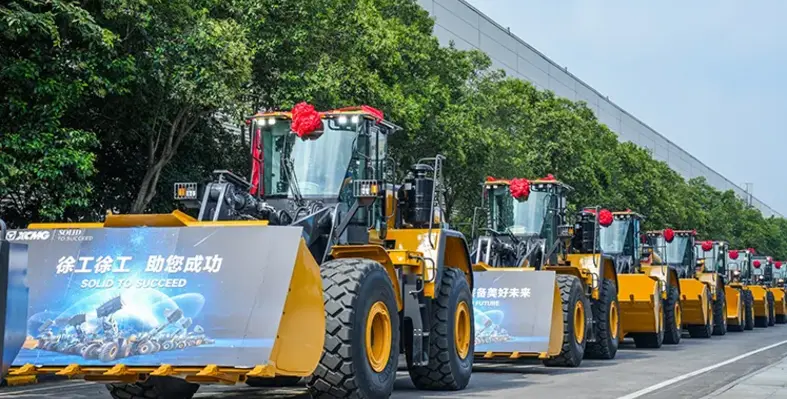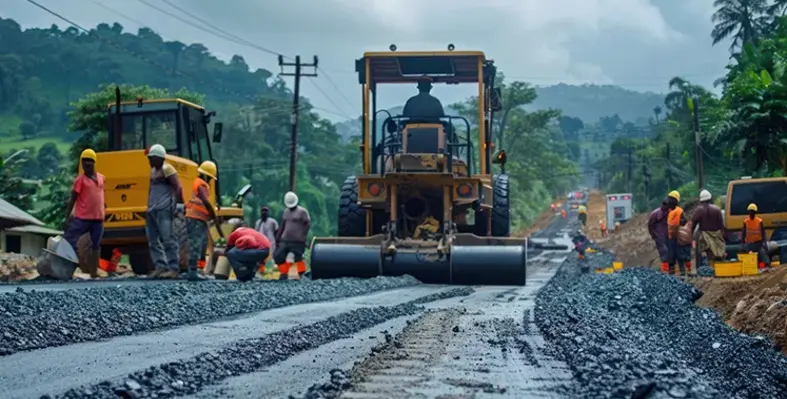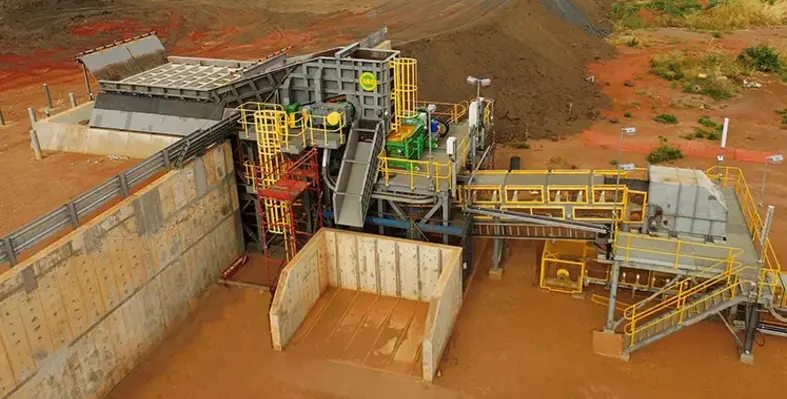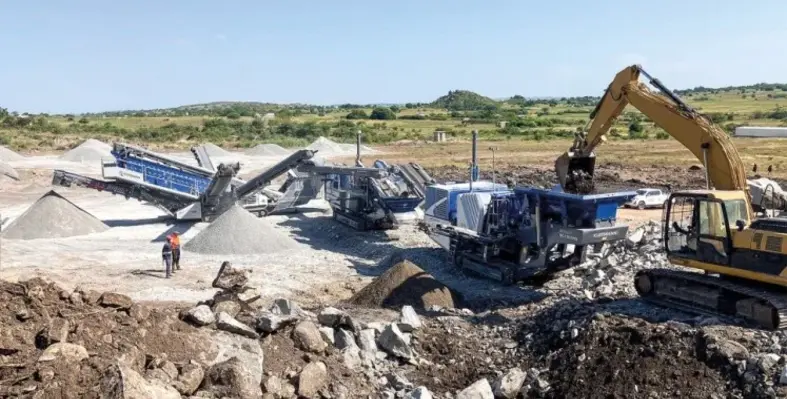Construction
New report showcases Liebherr’s engineering excellence

The new report highlights some of the innovations, partnerships and real-world projects that are defining Liebherr’s presence across Africa and the Middle East. (Image source: Liebherr)
Liebherr, in association with African Review and Technical Review Middle East, has launched a new report on Technological Progress in High-Risk Sectors Across Africa and the Middle East
The report examines the dynamic transformation of sectors such as mining, construction, energy, and logistics, which are evolving rapidly to meet rising demands for productivity, operational efficiency, and resilient infrastructure in increasingly complex environments.
Across Africa and the Middle East, businesses face challenges including remote project locations, extreme climates, underdeveloped infrastructure, and fluctuating regulatory and geopolitical conditions. Liebherr’s report highlights how its high-performance machinery, from earthmoving and material handling equipment to mobile and crawler cranes, mining trucks, and deep foundation solutions, is designed to operate reliably and efficiently even in the toughest conditions. The company’s focus on safety, energy efficiency, emissions reduction, and predictive maintenance ensures that clients can optimise performance while reducing operational risks.
Download this exclusive industry report:
-
Gain insights into the latest construction, mining, logistics, and infrastructure developments across Africa and the Middle East, and the trends shaping these high-risk sectors.
-
Access real-world case studies showing how Liebherr’s engineering excellence drives productivity and efficiency in challenging environments, from urban construction sites to remote mining operations.
-
Discover initiatives for workforce development and local capacity building, with training programmes and regional service centres enabling technical self-sufficiency across Africa.
-
Learn how advanced technologies such as telematics, autonomous systems, and intelligent fleet management improve operational visibility and decision-making.
-
Understand sustainability strategies, including fuel-efficient engines, partial electrification, and eco-driving initiatives, helping clients reduce emissions and meet environmental standards.
-
Explore partnership models that enable long-term industrial growth, strengthen supply chains, and foster innovation in both African and Middle Eastern markets.
This report provides valuable guidance for industry leaders, offering practical insights into navigating high-risk sectors with the right tools, technology, and expertise.
Don't miss out! Download the report here.
XCMG delivers 200 machines across regions

XCMG delivers 200 advanced heavy machines to West Asia and North Africa, enhancing efficiency and sustainability. (XCMG Machinery)
XCMG Machinery, a global leader in construction machinery, has reached another milestone in its international expansion by delivering a fleet of over 200 units of advanced heavy equipment to clients in West Asia and North Africa
This delivery underscores the company’s dedication to providing reliable, efficient, and sustainable solutions for construction and mining projects worldwide.
The latest shipment features XCMG's flagship models across essential equipment categories, each designed for superior performance and durability in the toughest working conditions globally:
Excavator – XE380G: Equipped with a Cummins 9L engine and 180 main pump system, the XE380G combines high productivity with low fuel consumption. Its reinforced frame, advanced filtration system capturing 99% of dust particles, and reliable cooling performance ensure durable operation even in extreme climates of up to 52°C.
Wheel Loaders – XC988H and LW700HV: The XC988H, with an 8.5-ton rated load and 5m³ bucket, is engineered for heavy-load mining applications, delivering stability and efficiency through its 250kW engine. The LW700HV features a 7.4-ton rated load with a 4.5m³ bucket and a 210kW engine, offering durability and operator comfort for demanding operations.
Dump Truck – XGA3251D5WC: Tested across 1.8 million km in over 100 working scenarios, this model ensures exceptional reliability. Its ECE R29-03 compliant cab, reinforced steel frame, and premium Weichai-Fast-Hande powertrain provide safety, strength, and transport efficiency across various terrains.
Motor Grader – GR2605: With intelligent control systems and ergonomic design, the GR2605 delivers precision grading with reduced fuel consumption. Its load-sensing hydraulics, adaptive fan system, and wet-type brake axle enhance efficiency and longevity, while the spacious cab with integrated air ducting maximises operator comfort.
“Every machine we deliver represents XCMG's dedication to quality, innovation, and customer success,” said Kang Jian, general manager of XCMG Middle East and North Africa. “With this new fleet delivery, we are once again demonstrating our ability to meet the evolving needs of global partners while contributing to more efficient, sustainable, and safe construction practices worldwide.”
As XCMG continues to broaden its global presence, the company remains committed to delivering advanced solutions that enable customers to address the challenges of modern infrastructure development and mining with confidence.
MAGNA names MMD Mineral Sizing Africa distributor
MAGNA, the Terex brand of mobile crushing, screening and conveying equipment for large-scale operations, has named MMD Mineral Sizing Africa (MMD) as its distributor for several southern African countries
Neil McIlwaine, business line director for MAGNA, said the collaboration marks a powerful endorsement from one of the mining industry’s most respected names.
“This is more than just a new distributor announcement,” he said. “MMD is a designer, manufacturer and engineering company in its own right, with a long-standing reputation for engineering excellence and customer-first service.
“Their decision to sell, support and service our complete lineup of MAGNA equipment across southern Africa is a strong signal that our machines meet the rigorous demands of large-scale mining operations and that our commitment to customer support aligns with their own.”
With over four decades of innovation, MMD has helped shape the future of materials processing, with its tailored solutions and proprietary technologies trusted across the mining, quarrying, and recycling sectors.
From compact machines to large-scale mobile sizer stations, MMD’s expertise spans the full spectrum of operational needs for these industries.
“This is also a flagship moment as it marks the first time MMD will represent a Terex brand,” said McIlwaine.
“Their choice of MAGNA reflects a shared belief in delivering robust, quality solutions, developed specifically for customers handling larger volumes and requiring superior output performance.”
MMD has long recognised Africa as one of the world’s most important mining markets, with large-scale operations demanding high-output, reliable equipment and responsive service.
In 2004, it expanded its manufacturing footprint beyond the UK by establishing a plant in South Africa, bringing production closer to the heart of the industry.
This move was driven by demand and a commitment to better serve customers in the region.
By adding MAGNA to its portfolio, MMD is now equipped to offer a diverse and comprehensive product range to African mining operations.
MAGNA is built for scale, designed to meet the demands of high-output operations up to 1500 TPH and backed by decades of experience and the strength of Terex’s world-leading brands.
“This collaboration brings together two brands that understand the importance of performance, reliability, and customer service,” said Janis Lombard, director for MMD Mineral Sizing (Africa) Pty Limited.
“We are excited to become part of the MAGNA distribution network and look forward to supporting our customers with machinery that’s built for the biggest challenges.”
Read more:
Komatsu invests in intelligent vehicles with applied intuition
FL Smidth receives portal cranes for Ghana work
Sandvik secures major equipment deal for Botswana mine
Kleemann plant train powers granite quarry in Tanzania
A powerful Kleemann plant train is making its mark at a granite quarry in Tanzania, showcasing strength, efficiency, and reliability
The set-up includes the MOBICAT MC 110 EVO2 jaw crusher, the MOBICONE MCO 90 EVO2 cone crusher, and the MOBISCREEN MSC 953 EVO screening plant, all working seamlessly together after an adventurous journey to reach the site.
A challenging journey to Mwanza
The Kleemann machines began their long trip from Europe to Dar es Salaam, Tanzania. After clearing customs, they were transported by flatbed trucks, rail, and finally along a rugged ten-kilometre dirt road deep into the hinterland. Their final destination was a newly established quarry near Mwanza, close to Lake Victoria, where Sasco Trading is processing granite for infrastructure projects.
“The transport was quite complex and involved. It demonstrated just how important compact mobile plants are,” commented Markus Hofmann, Kleemann Area sales manager Africa. “All the machines were relatively easy to load and transport thanks to their compact design – which proved to be a real advantage on this project.”
Sasco trading’s ambitious entry into quarrying
Sasco Trading, a newcomer to the industry, has set its sights high as Tanzania pushes forward with major road construction projects. The company sees a strong role for itself in supplying essential materials.
The granite being processed is extremely hard, making equipment choice crucial. “We conducted an in-depth search to find out what equipment was available,” explains Sasco Trading owner Sabasi Shirima. With Kleemann already established as a leader in Tanzania and multiple plant trains in operation, the company opted for their proven reliability. “The crushing and screening plants have a very good reputation in Tanzania. This was ultimately the deciding factor for us. Now that we have seen the plants in operation, we know that we made the right decision.”
High output and low fuel use
The plant train processes granite up to 500 mm in size. The MOBICAT MC 110 EVO2 handles the primary crushing, while the MCO 90 EVO2 cone crusher ensures the right grain size and shape. The screening plant then classifies material into three end products: 0–6 mm, 6–10 mm, and 10–18 mm, with other variants available on demand.
With a capacity of 150 tons per hour, the system delivers exceptional performance alongside low fuel consumption: just 12 litres per hour for the MC 110 EVO2, 19 litres for the MCO 90 EVO2, and 16 litres for the screening plant.
Sabasi Shirima emphasises the decision was right: “The crushing and screening plants have a very good reputation in Tanzania. That was ultimately decisive for us. Now that we have the plants in operation, we know: Our decision was correct.”
Intelligent line coupling and automation
The Kleemann plant train benefits from intelligent line coupling and the Continuous Feed System (CFS), which ensure efficient material flow and maximise crusher utilisation. Machines communicate automatically to prevent overloading, and in case of an emergency stop, the entire system halts safely.
“Intelligent interlinking is one of the plant train’s outstanding features. Thanks to automated processes, our customers can look forward to much higher output and much less maintenance,” notes Kleemann expert Jerry Muchiri, who supported the project on site.
User-friendly operation with SPECTIVE
Training new operators was straightforward thanks to Kleemann’s SPECTIVE operating system. Some of Sasco’s team had prior experience with Kleemann equipment, but even newcomers found the system easy to navigate.
“Our employees found their way around very quickly,” says Sabasi Shirima. “The training was thorough but very easy to understand – and the operation afterwards was extremely straightforward.”
Strong on-site support
A ten-day visit from a Kleemann service technician ensured smooth commissioning and detailed operator training. Additional training sessions are available later, either on site or via video conference.
“We know that we won’t be left on our own with any issues in the future. That’s peace of mind,” highlights entrepreneur Sabasi Shirima.


